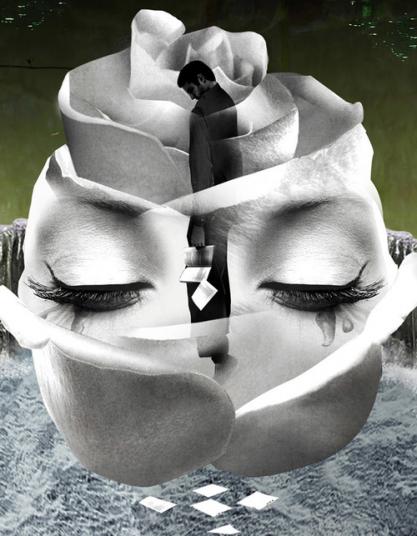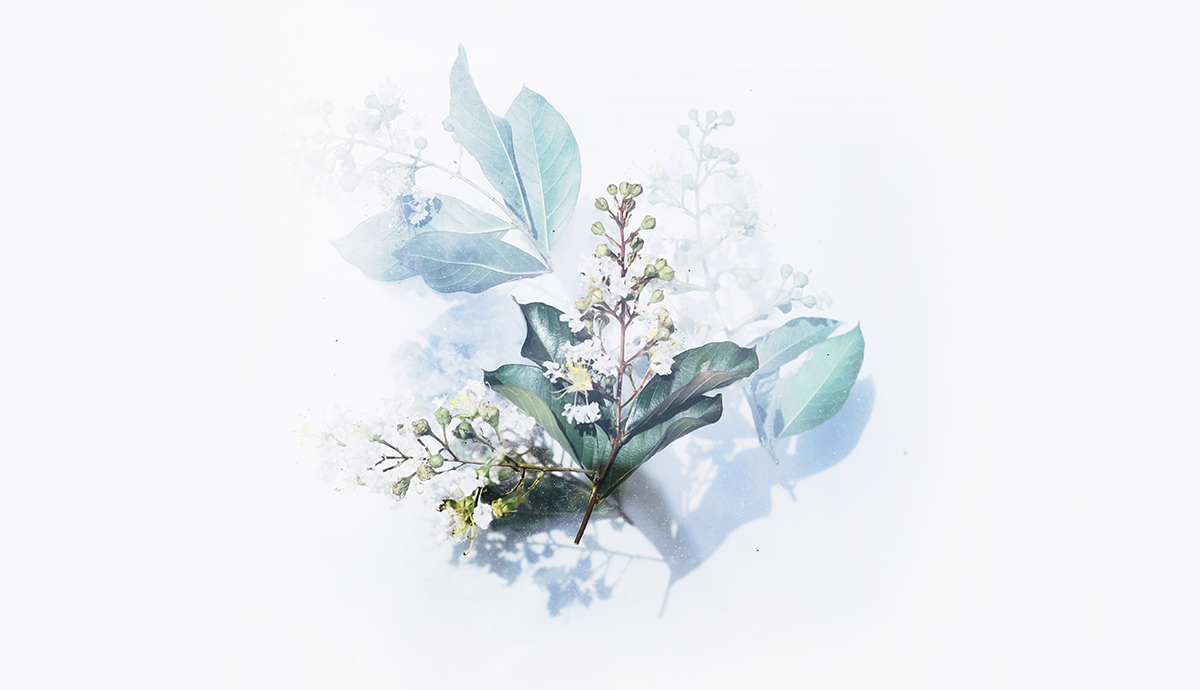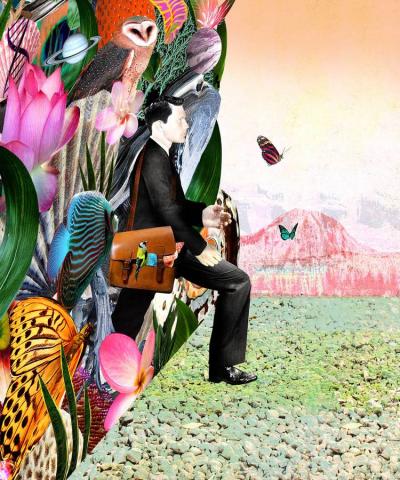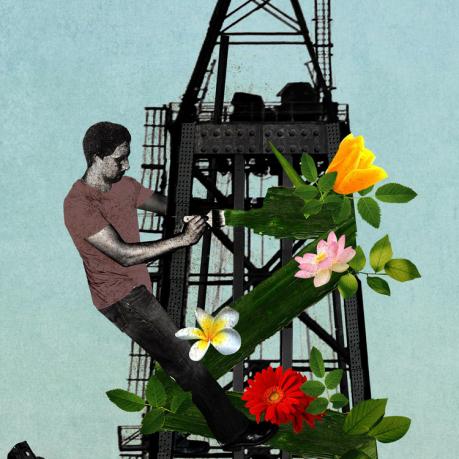Amy Glynn gives us an excerpt from her in-progress essay collection "Knotweed, Bindweed, Crabgrass, Thorn: Field Notes on Making Your Bed and Lying in It, Bolting, Reaping What You Sow, and Other Useful Domestic Metaphors."
5.28
I see humanity now as one vast plant, needing for its highest
fulfillment only love, the natural blessings of the great
outdoors, and intelligent crossing and selection.
The damned thing split right along the midline of one of the primary limbs. Cracked under its own weight.
Ham-fisted symbolism in this backyard has just gone far enough already. Things wither unexpectedly, things overproduce and go to waste. Things you nurture and encourage and coax into giving you fruit instead rot, drop dead, get gnawed by rats, stolen by morbidly obese squirrels, set a bunch of fruit and then pitch it all before it gets ripe. And I feel badly for the tree, because that splintering exposed heartwood looks painful, but I am aware of a brooding, smoldering sense of—what?
I tended this tree. I put it in the ground, a sapling, a baby, small enough for me to carry with one hand. I have groomed and clipped and shaped and fed and harvested the thing for nine years. Why must it, like everything else in the world and on such obnoxiously, face-slap-obvious timing, break?
The plums dangle in huge clusters, rosy or bluish, softly glaucous and exuding a whispery, oddly amorous perfume—I don’t have another word for it; it’s a come-hither smell, a come-on-take-me smell. The tree is one of storied horticulturalist Luther Burbank’s most enduring masterpieces, a Japanese-hybrid plum called Santa Rosa. That you can also find them in any west coast supermarket made them relatively unattractive to me, but they were recommended as the best pollinizer for my fetish plum, a green-skinned, scarlet-fleshed “blood plum” called Satsuma, first sent to market (also by Burbank) in 1899. Look it up and you’ll see it says it’s commonly cultivated, but I find it elusive to nonexistent even in farmers markets. Truth be told, I did not push to come back to this county, in the valleys east of Oakland, for the “good” public schools. I came because of that plum. Childhood next-door neighbors had an overbearing beast of a Satsuma—who could imagine so much fruit from such a petite tree? Outrageous floods of them, all ripe at once, nothing for it but to learn to preserve, not to mention eat nothing but plums for three weeks. Refugee grocery bags of them found themselves on our front porch every summer. Because no one could eat them all.
I could, though. My parents kept saying I’d make myself sick. I never did.
In typical fashion for this holy war I call a garden, the thing I had planted as a concession thrived. The thing I planted for love withered. Still, no complaints about the plum that lived. Santa Rosas require little care, bear heavily (sometimes overwhelmingly), and, maybe because they’re naturally full of serotonin or maybe just because they are idyll incarnate when conveyed directly from branch to mouth, they just make you happy.
Plants speak to us, however wild or trained they are, however apparently simple or complex. They just don’t use words—though I suspect they appreciate them. The plum’s message is this: be patient and you will be taken care of. Tend me and I will tend you. Abundance and want follow one another eternally, so stop right now and enjoy this. You won’t receive that message from a plum plucked from cold storage in your supermarket. It might still taste good, but it has been detached from its source for so long it no longer remembers what it was trying to say.
I am alone. The children are with their father. Sun and tree alike past apogee, trending downward. It is early evening, late June.
Early evening, late June. The air smells like mesquite smoke and chlorine and plums; warm from the sun, the tree exudes a kind of exotic yet eerily familiar perfume. It smells like renewal, like rot, like love.
It’s still 98 degrees outside, down from an unpleasant pinnacle of 105. The kids are in the swimming pool; water rebounds off tiles, chaotic small waves that catch the sun and throw little liquid sparks.
Laughter; husband playing pool games with kids, friends cracking jokes, the soft pop of the cork being pulled on another bottle of the insanely beautiful orange Roussanne made by friends of ours. The heat has its own sound; an arid, windless composite of air rising from the scorching pavement; of the sharp, chiding voices of the hummingbirds and of the whirring of their wings; of the low scraping of cicadas, the high distant scream of a red-tailed hawk; foliage wilting audibly in the garden; the gentle slap of water against the pool’s coping; all underscored by a profound and almost subsensory hum which seems to be the actual sound of radiation from the sun.
I am gathering plums in my skirt; now that the mercury’s back in double digits I’m going to brave the kitchen and make a tart. One of our friends trails me, gathering the ones I’m missing. The Satsuma is bothering me. Planted in the same soil on the same day, it is a quarter of the size of the Santa Rosa, and the fruits are fewer, tougher and smaller every year. This year I’m not even picking them. I can see its slow trajectory toward defeat, the tree kind that takes years of agonizing burnout. It still flowers and bears fruit and grows and drops leaves, but it will be dead within five years.
In spite of every conceivable intervention, so will my marriage.
 “My God,” my friend says. “Your garden is magic.”
“My God,” my friend says. “Your garden is magic.”
Don’t get me wrong, this “magic” is the product of constant sweat and scratches and back spasms but still, yes, at the moment I think so too, how what I have managed to do with the trainwreck we bought is in fact amazing, that I criticize my failures to prune or weed or plant something in time far too harshly, and that I should learn to see what other people see, which is a sort of domestic paradise, part idyll, part micro-farm. My kids have never seen the inside of a McDonald’s, but they know which weeds you can eat and which ones are better left alone; they know what strawberries taste like when they’ve had a transit time of 3 seconds from stem to stomach, they know which beans are the Romanos and which are the Dragon’s Tongues. They can tell you when Meyer lemons ripen and which chicken lays which egg.
Everyone is the picture of pure voluptuous, indolent, summer-Sunday contentment.
What they don’t know is that once they drive off, my husband and I will not speak to each other. He will busy himself with putting the kids to bed and leave me with the dishes and the remarkable amount of recycling left in their wake.
They don’t know he will stay up watching the most inane television he can find so he does not have to go to bed with me.
They don’t know I’ll go to bed early to ensure I am asleep by the time he comes in because I know if he falls asleep first the snoring will cause me to stay up all night seething and fighting the urge to kick him awake.
They don’t know things have been cracking for so long I no longer remember what it felt like when they weren’t.
When my friend called the garden “magic,” she didn’t hear the sotto voce reply from the swimming pool, “Yes, there are lots of things with thorns. In places where people walk.” He has a knack for doing that in a way no one hears but me.
They don’t know it is always like this.
They don’t know it has almost always been like this.
Or has it? Am I making that up? Justification? Pathological focus on “the negative?” Am I crazy, wildly, violently unfair? Didn’t we love each other?
Didn’t we promise to?
But here, now, it is a beautiful hot early summer Sunday, this group of our friends are gathered under our palm tree in our backyard and are about to be treated to a large amount of amazing food that was alive and growing hours or minutes ago, and I have plum juice all over my hands and my skirt and running down my chin like some beautiful simile about abundance and prosperity and plenty and sensuousness and the rewards of effort and no one knows. They don’t know the other me, the other him. They don’t know what happens when the door closes.
I’m not strong enough to pull the halves of the split branch together to try to bind them. I don’t want to call anyone for help. I am tired of needing help. I know this is wrong: none of us really accomplishes anything alone, at least not the big stuff. It’s one of the reasons we get married. Because you can do more that way, accomplish more, have someone with whom you share—oh, say it—the fruits of your labor.
Or I could leave it, pull the plums as soon as they’re ripe—I think they will still ripen —and then prune the branches and hope the thing scars over and heals, a lame limb, a broken limb, but—you know, still part of the tree. The entropy method. “Lassitude” or “Let Nature Take Its Course” depending on your perspective.
It might be the right move and it’s certainly the easiest. But to be honest, I’ve had it with broken things. I want all of them gone. Even if, as Leonard Cohen famously sang, “There is a crack in everything: that’s how the light gets in.”
Artist:
Anthony Tremmaglia, an Ottawa-based illustrator, artist, and educator. His clients include WIRED, Scientific American, Smart Money, HOW, and San Francisco Weekly. Anthony is featured in issues 299.1, Winter 2014 & 299.4, Fall 2014 and his most recent work is featured in issue 300.3, Summer 2015.
"Quebec"





